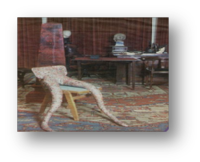A Contemporary History of Female Sexual Dysfunction, 1960 to the Present
Sarah Lucas, Hysterical Attack (Mouths), exhibited in the Freud Museum, London, 2000.
‘Female Sexual Dysfunction’ (FSD) is an umbrella term for diagnoses in the American Psychiatric Association’s Diagnostic and Statistical Manual (DSM) relating to desire, arousal, orgasm, and pain. According to a recent and widely disseminated statistic, 43% of women suffer from a sexual dysfunction. Several pharmaceutical compounds for female sexual problems are in development, and the condition is gaining in media prominence.
My research asks what are the shifting relationships between psychiatry, feminism, and sexology since 1960 that have enabled FSD to emerge as a medico-psychiatric category in the US and UK. The project enables a re-assessment of historiographies of the post-war decline of psychoanalytic psychiatry and the emergence of a renewed ‘biological psychiatry’. Making use of a wide range of sources, medical and popular, it also details the legacy of the fraught relationship between feminism and psychiatry in contemporary post-feminist discourse about sex and in the avoidance of etiological questions that characterises the contemporary FSD debate.
Female sexual problems have long been the subject of psychiatric and sexological discussion, with psychoanalysis dominating their conceptualisation until the 1960s. Thereafter, psychoanalysis began to lose its influence in American psychiatry, and earlier concepts of ‘frigidity’ began to be replaced by Masters and Johnson’s new classifications of ‘sexual dysfunctions’, incorporated into the DSM-III in 1980.
 |
Events
|
 |
Publications |
| |
Conferences / seminar papers |
My research asks the following key questions:
How and why were ‘sexual dysfunctions’ incorporated into DSM-III in 1980? And how does this incorporation complicate the view that DSM-III represented a categorical shift from a psychoanalytic to a biological psychiatry?
What was the impact of scientific, philosophical and feminist critiques of psychiatry and psychoanalysis, from the 1960s, on the DSM’s definitions of FSD, and on wider psychiatric discourse about sexual problems?
How has British psychiatry, with a history of healthcare provision distinct from that of the US, conceived of sexual problems since DSM-III? And what does this reveal about whether the DSM-III has, as is often claimed, fostered an internationalised psychiatry?
What are female sexual problems – and their causes and solutions – understood to be in popular American and British resources? How prominent is the medico-pharmaceutical discourse in these arenas, and what does this tell us about the relationship between medical and popular discourse on sexual problems?


American Psychiatric Association
Wellcome Trust Library for the History of Medicine
The Kinsey Institute for Research in Sex, Gender, and Reproduction
Exeter University Centre for the Interdisciplinary Study of Sexuality and Gender in Europe 
Cambridge University History and Philosophy of Science Department Generation to Reproduction Project

